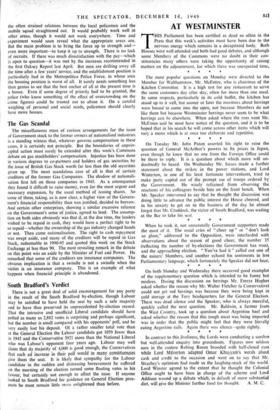The Gas Scandal
The miscellaneous mass of curious arrangements for the issue of Government stock to the former owners of nationalised industries is a standing witness that, whatever governs compensation in these cases, it is certainly not principle. But the boundaries of unprin- cipled action must surely be extended after this week's Commons debate on gas stockholders' compensation. Injustice has been done in various degrees to co-partners and holders of gas securities by the issue of British Gas Stock worth far less than the old securities given up. The most scandalous case of all is that of certain creditors of the former Gas Companies. The shadow of nationali- sation first fell on those companies in 1945. As a consequence they found it difficult to raise money, even for the most urgent and necessary expansion, by the usual method of issuing shares. So some of them, taking. as is now clear, a higher view of the Govern- ment's financial responsibility than was justified, decided to borrow. And certain other enterprises, showing a similar excessive reliance on the Government's sense of justice, agreed to lend. The assump- tion on both sides obviously was that if, at the due time, the lenders wished to be repaid in cash, they would have a perfect right to be so repaid—whether the ownership of the gas industry changed hands or not. Then came nationalisation. The right to cash repayment was swept aside, and many of the creditors will be repaid in Gas Stock, redeemable in 1990-95 and quoted this week on the Stock Exchange at less than 90. The most revealing remark in the debate on this point was an aside by the Minister of Fuel and Power. He remarked that some of the creditors are insurance companies. The obvious implication is that a swindle is not a swindle when the victim is an insurance company. This is an example of what happens when financial principle is abandoned.


































 Previous page
Previous page